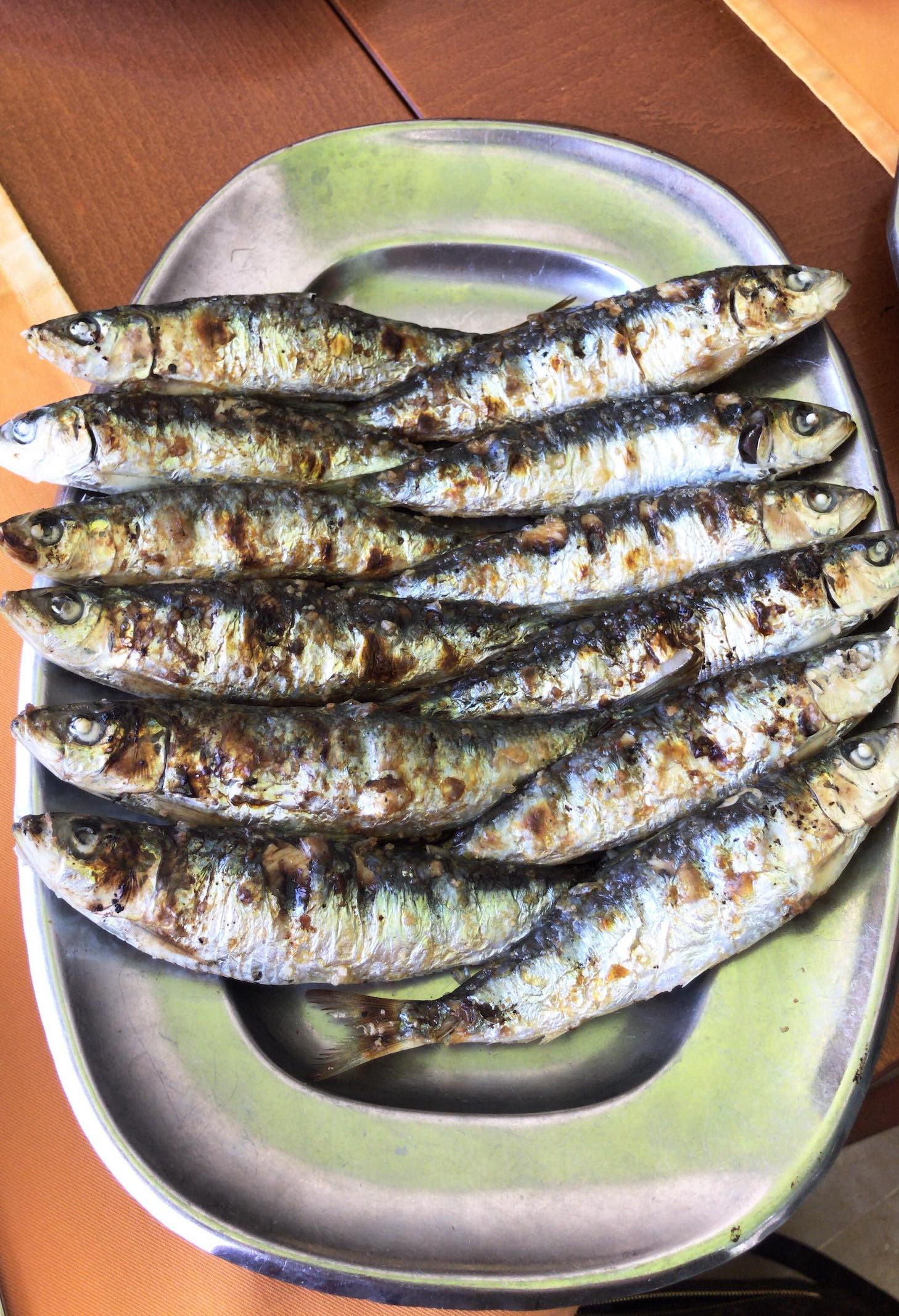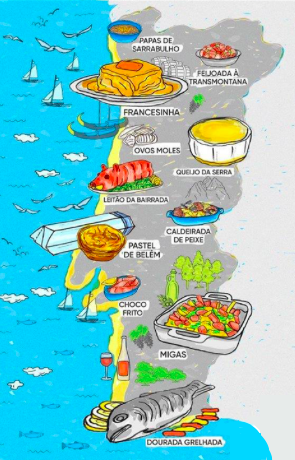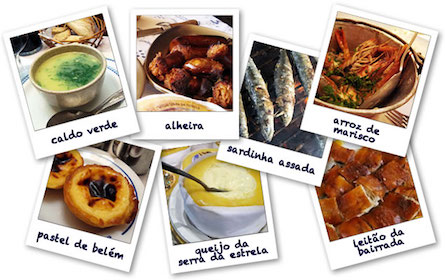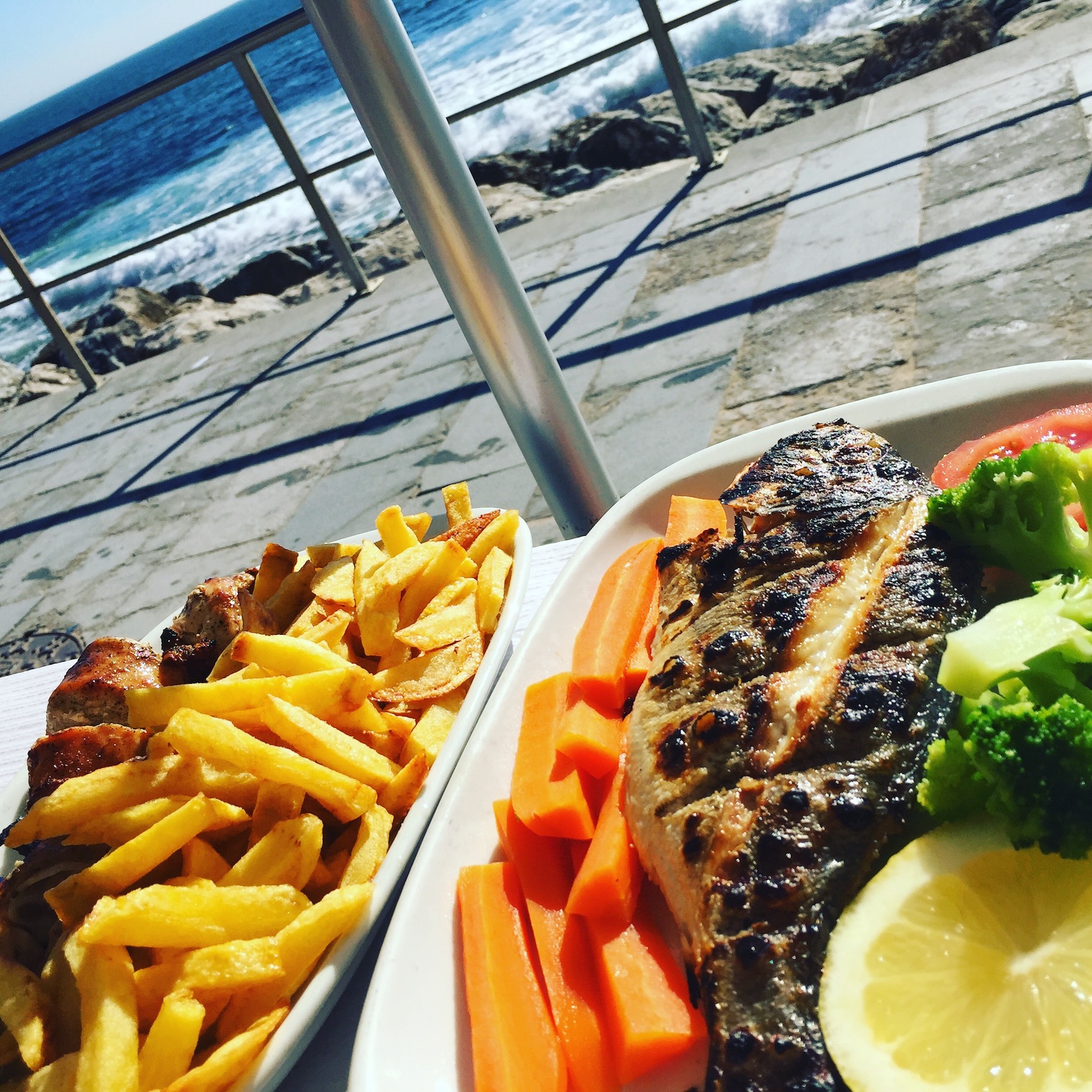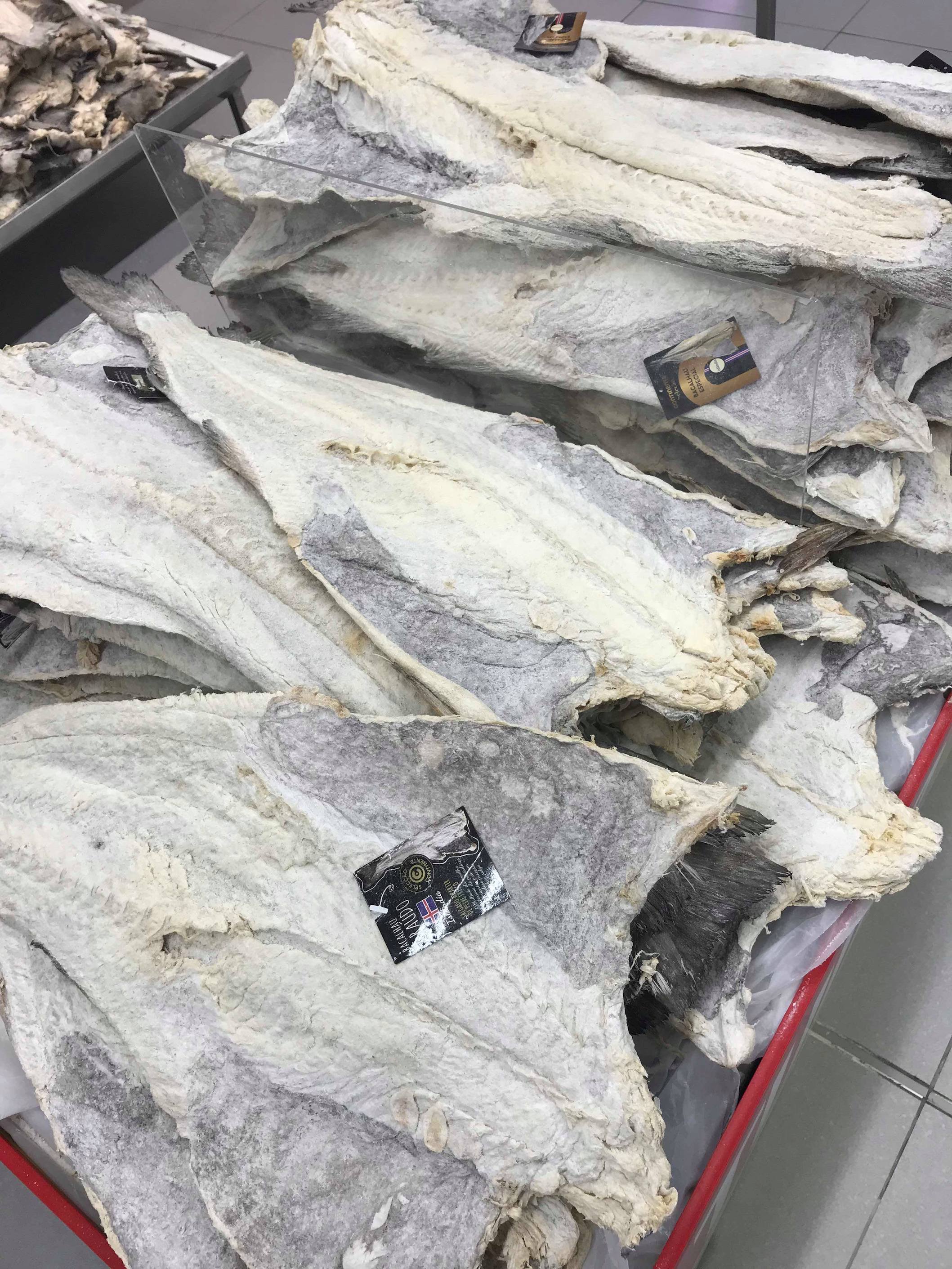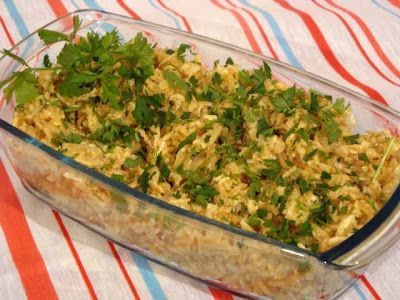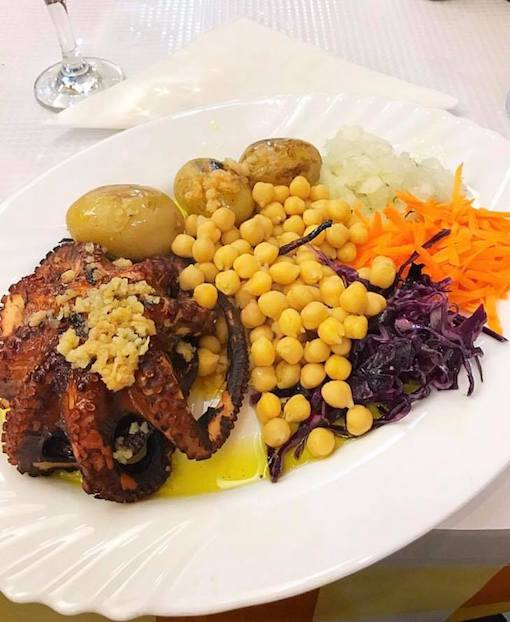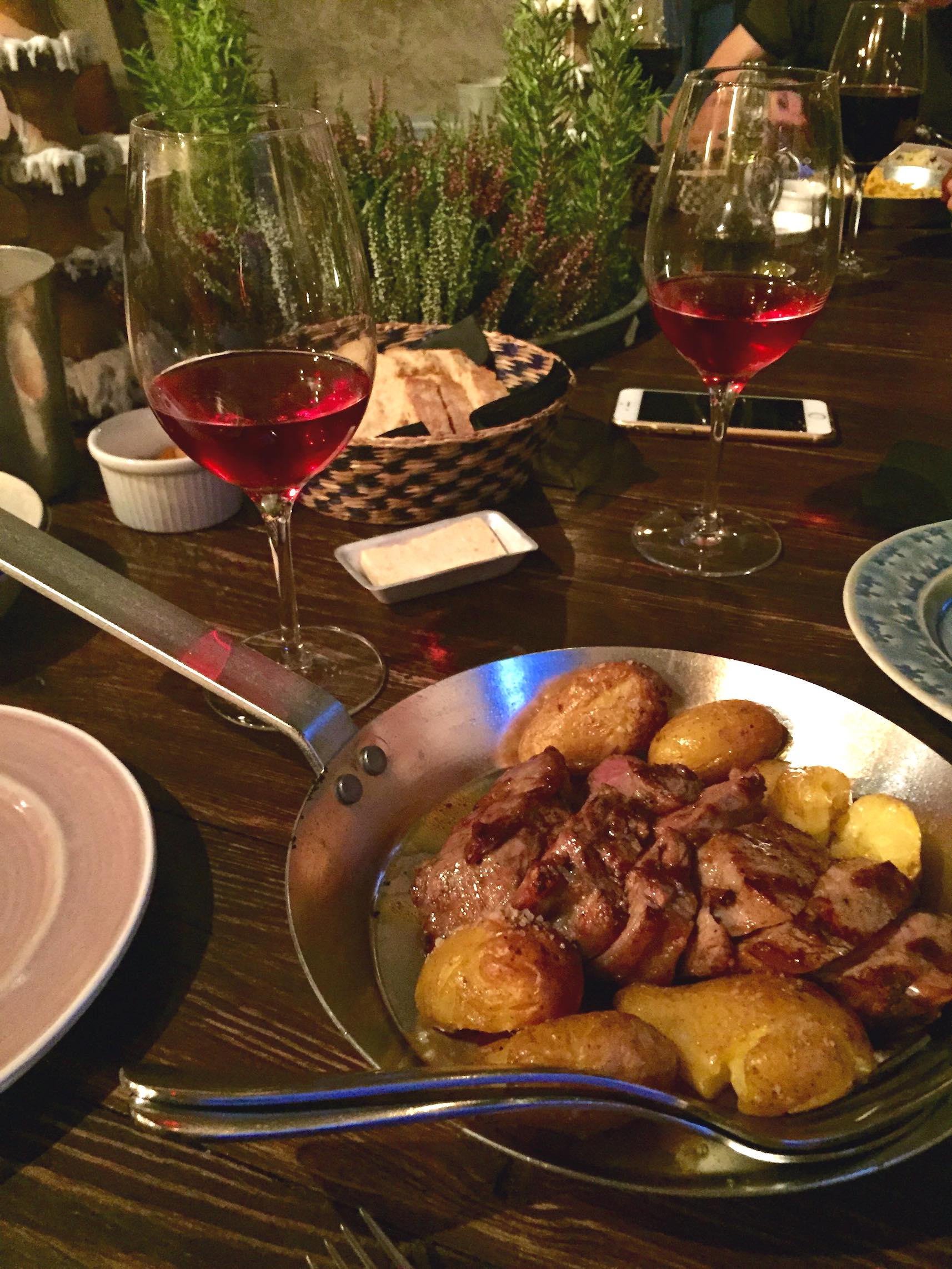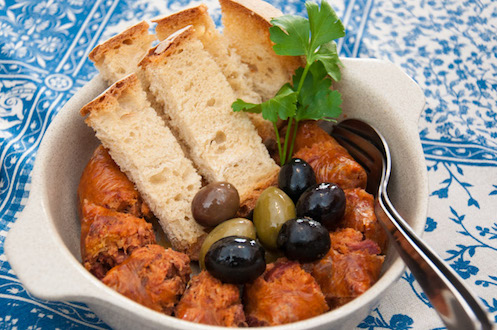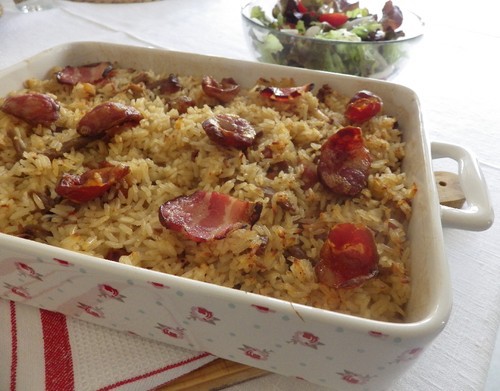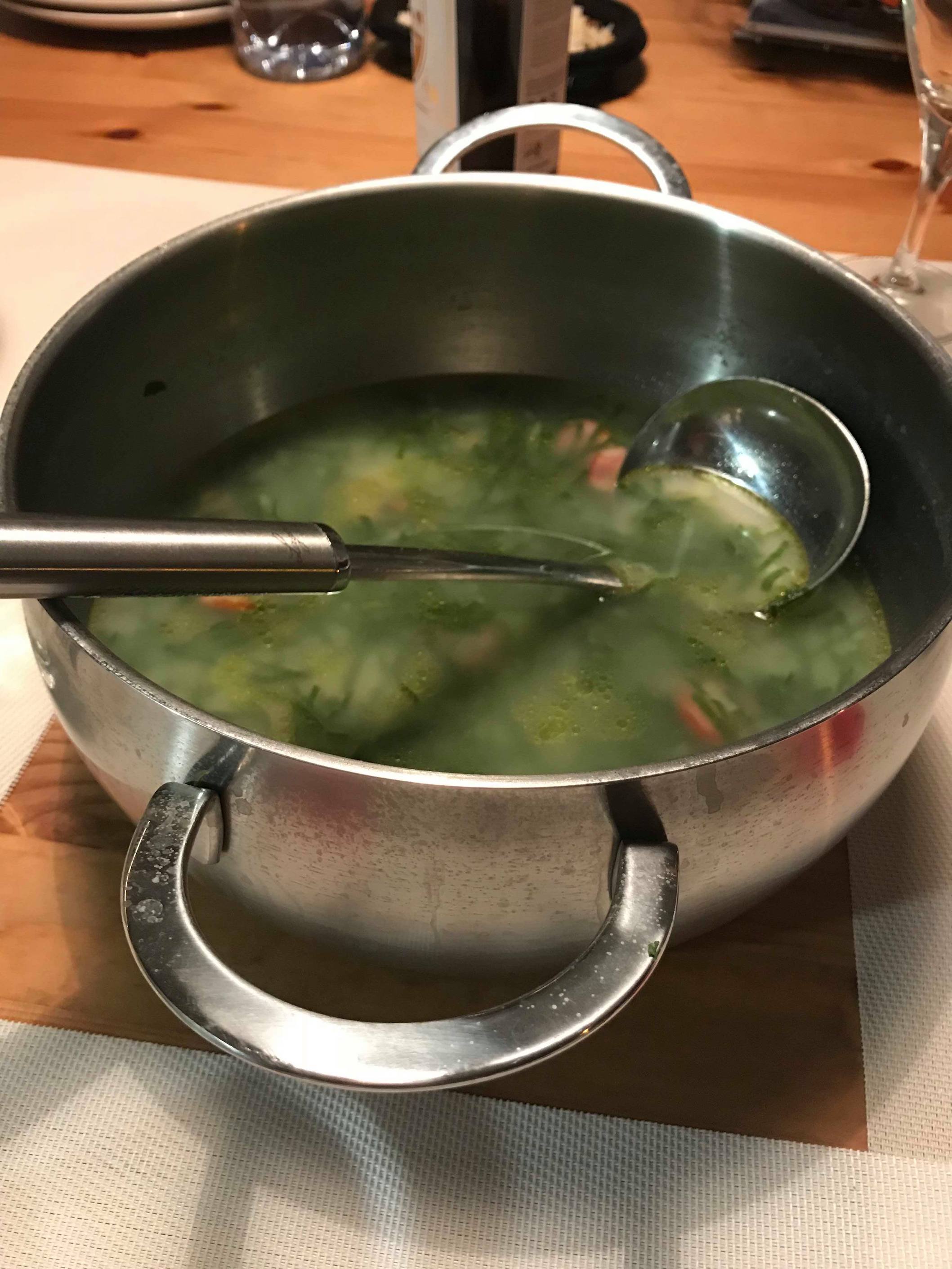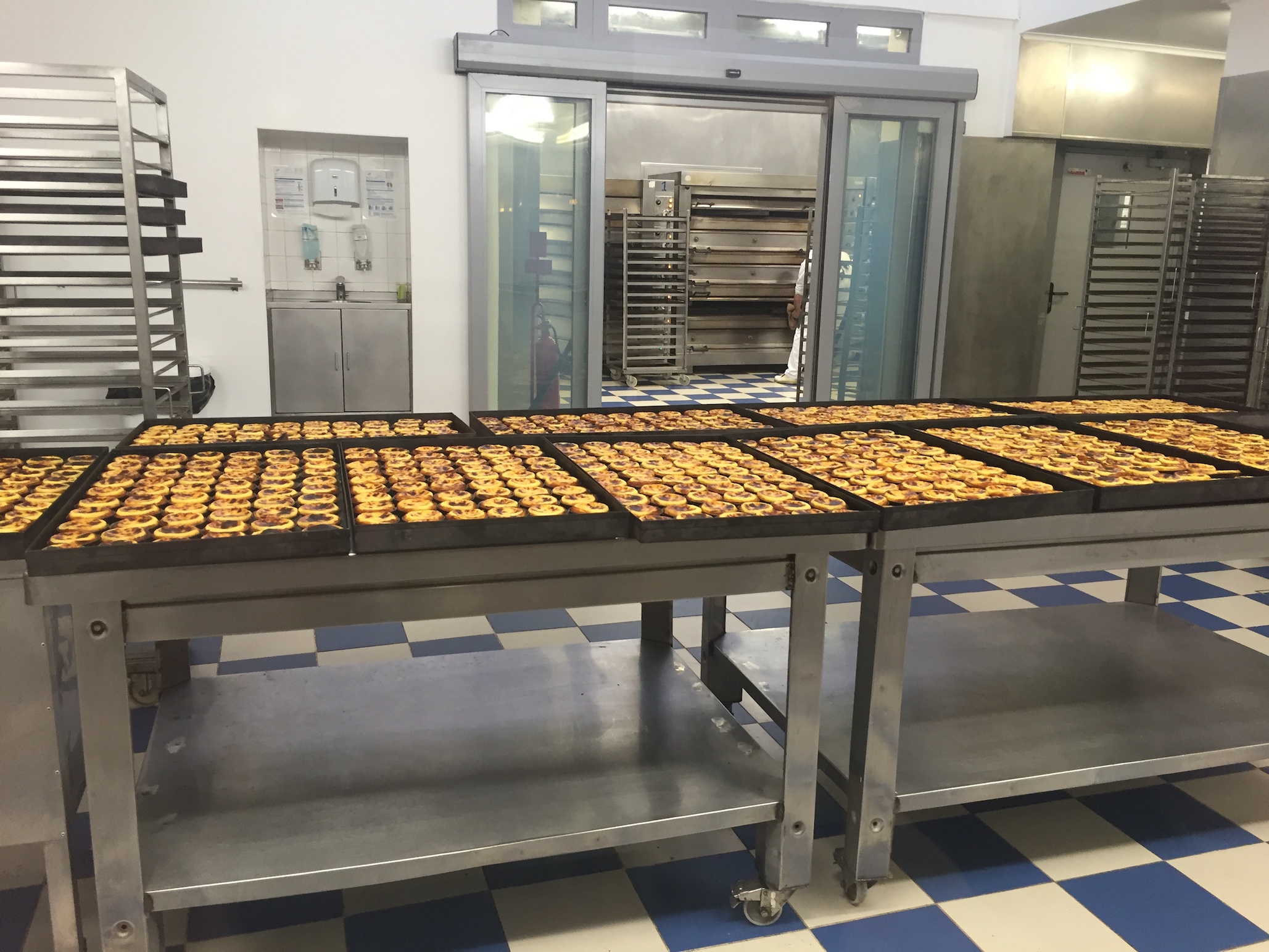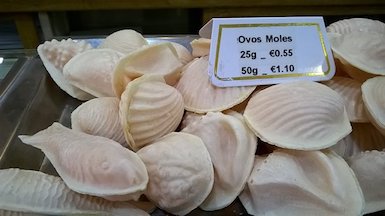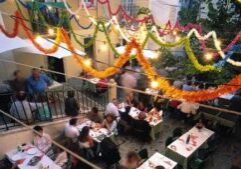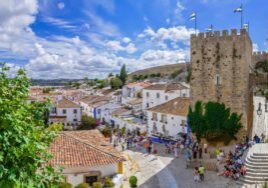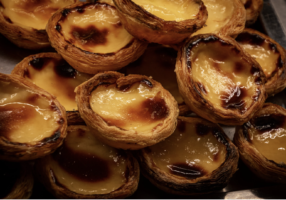Portuguese gastronomy: a cuisine to discover!
![]()
On today’s menu: food, food and more food! Portuguese gastronomy is one of the best I’ve ever tasted, yet it’s little-known outside its borders.
When you arrive in a new country, the beginning of your integration is often through the cuisine. It’s your first introduction to the culture, your first conversations with the locals, and the first words in Portuguese you’ll learn will often be when ordering in a restaurant. Finally, when you bring back memories of Portugal, they are also often food-related, like the list I drew up in my article: 14 souvenirs from Portugal.
Before reading this article, I’d like to warn you that it may lead to a sudden craving for Portuguese food. So, are you ready to salivate? Here’s some information on Portuguese gastronomy to pick and devour at your leisure.

Portuguese gastronomy: what you need to know.
In Portugal, cuisine plays a very important role, and know-how is passed down from generation to generation. Portuguese cuisine is “no-fuss”, family-style, tasty, made “with love” and generous, VERY generous. As you may have noticed, the dishes served are often copious portions. As an example, below is a dish of grilled sardines for one person(12 sardines)! The further north you go, the fuller your plates will be. In fact, in many restaurants, you have the choice of ordering a “dose” or a “meia-dose”. If you’re on your own, I recommend ordering a “meia-dose”, which is usually more than enough to fill your stomach.
A dish of grilled sardines for one person.
Even though the Portuguese love to cook, eating out is an integral part of their routine, whether it’s during the week with colleagues, or at the weekend with family. Even in the morning, it’s customary to have breakfast at the local café, whereas in France it’s very rare to eat out. The popularity of restaurants can be partly explained by their very affordable prices. In fact, it’s not uncommon to pay less for a dish in a restaurant than if you were to cook it yourself. For example, the other day, a sea bream in the market cost me 11 euros, whereas in a restaurant, a similar sea bream, prepared, grilled and served with a side dish, cost me 10 euros.
On the other hand, while the French are used to eating starter-main course-cheese-dessert. The Portuguese, on the other hand, will choose a main course and a dessert, and as an aperitif/entrée, they’ll nibble on the little “starters” often brought to restaurant tables without you even having ordered them. These often include olives, rissois(a kind of doughnut), cold meats, cheeses, breads, etc. Bear in mind that if you eat these little dishes, you’ll pay for them; if you don’t, you won’t be charged.
Finally, you should know that each region has its own specialties (some of which are listed on the map below). In my opinion, it’s a good idea to sample these as you travel around Portugal.
Some of Portugal’s culinary specialties: feijoada from Transmontana, choco frito from Setubal, migas or açordas from Alentejo…
In 2011, seven Portuguese dishes per category (soup, meat, fish, cheese, dessert) were elected as the Seven Wonders of Portuguese gastronomy, and we’ll be coming back to several of them throughout this article. What are these 7 wonders?
The 7 wonders of Portuguese gastronomy.
Have I made your mouth water? So let’s get down to business. For you, future holidaymakers, future Portuguese residents, who didn’t know which Portuguese dish to start with, I’ve listed 15 dishes to put on your top list of things to try in Portugal. (In the interests of article length, I haven’t been able to list all the must-try dishes in Portugal, or all the great wines this country has to offer, so don’t hold that against me).
Seafood lovers, the “fish and shellfish” category is for you!
With a 940km coastline, Portugal is largely bordered by the Atlantic Ocean, and this proximity obviously influences its gastronomy. In fact, many of its dishes are based on seafood.
So, if you’re a fish lover like me, you won’t be disappointed. I don’t go a week without eating some delicious charcoal-grilled fish. It makes the fish taste so good, my mouth waters just talking about it! A word of advice: avoid eating fish on Mondays, as fishermen don’t usually go out to sea on weekends, so Monday’s fish is often from Friday’s catch, and therefore a little less fresh than on other days.
Grilled fish aside, Portugal offers a host of typical seafood dishes, each more delicious than the last. Here’s a list of five must-tries.
Grilled sea bream (dourada grelhada) and grilled chicken (frango churrasco).
1. Bacalhau com natas”: a classic not to be missed!
The first dish I present to you is made with a fish that is emblematic of Portugal: cod (“bacalhau” in Portuguese). Cod is a staple of Portuguese cuisine. Just take a trip to any Portuguese supermarket and you’ll see the huge stalls of dried cod. There’s even a legend that the Portuguese have 365 ways of cooking cod, one for every day of the year. Personally, I’m far from having tried them all!
In Portugal, one of the must-try cod dishes is“bacalhau com natas” (cod with cream). This dish is made with cod, of course, but also onions, potatoes and cream(the famous “nata”). Legend has it that this dish was invented in the 1930s by a great chef named João Ribeiro, who worked in the kitchens of the Hotel Aviz in Lisbon.
Sale of dried cod in a supermarket.
2. Bacalhau à brás”: this dish is loved by young and old alike.
As I said, there are 365 cod dishes in Portugal, so I can introduce you to a second one, which is bacalhau à brás, a very popular dish in Portugal. In fact, it’s very easy to make yourself. Even I, who am a VERY bad cook, managed to make this dish. It’s made with crumbled cod, finely chopped French fries, fried onions, eggs, olives and parsley. A delight for young and old alike! The story goes that the recipe for bacalhau à Brás was invented by Monsieur Braz, a tavern-keeper in Lisbon’s Bairro Alto.
Bacalhau à brás is often garnished with fresh coriander, an herb much used in Portugal.
3. The “sardinha grelhada”: to be enjoyed during popular festivals in June.
I spoke earlier about the multitude of grilled fish to be enjoyed in Portugal, but one of these grilled fish enjoys a very special status: the sardine. Like cod, it’s an emblematic fish of Portugal. In fact, it’s not uncommon to see many Portuguese souvenir gifts featuring sardines.
The rule is that sardines must be eaten in the months without an “r”, i.e. May, June, July and August. One of the best months to eat sardines in Portugal is June, during the popular festivals of the Portuguese patron saints. Indeed, on São João day in Porto and Santo Antonio day in Lisbon, you’ll find barbecues set up all over the streets, with lots of sardines being grilled. A festive and convivial moment not to be missed, often renamed by French speakers “la fête de la sardine”.
And if you’re more of a fan of canned sardines(a major industry in Portugal), take a trip to Conserveira de Lisboa, a true Lisbon institution.
Grilled sardines, sea view.
4. The “arroz de marisco”: Portuguese paella
In another register, that of seafood, I invite you to try arroz de marisco, which could be translated as rice with shellfish. This traditional Portuguese dish originates from “praia da vieira”, in the Marinha Grande region, near Leiria(central Portugal). It’s a mixture of rice, shrimp, lobster, mussels, cockles, crab cakes…
I recommend trying this dish in its region of origin, but for those passing through Lisbon, I recommend the UMA restaurant in the Baixa Chiado district, whose specialty is this dish. However, you’ll have to be patient, as it’s a very small restaurant and places are expensive.
5. Polvo à lagareiro”: my favorite Portuguese dish
To finish my list of the 5 Portuguese seafood dishes I recommend, here’s the polvo à lagareiro, my “favorite”. This dish is made with roasted octopus, soaked in olive oil and often accompanied by chickpeas and “batatas a murro”, lightly mashed potatoes. This dish is thought to have originated in the Beiras, an area between the south of the Douro and the north of the Tagus. Octopus is often eaten in Portugal on special occasions, especially Christmas.
The term “lagareiro”, which you’ll also find in the titles of other Portuguese dishes such as “bacalhau à lagareiro”, refers to the “lagar”, the olive press from which olive oil is made. The “lagareiro” was the “lagar” worker. Thus, dishes with “à lagareiro” in the title are those on which olive oil is generously drizzled.
Polvo à lagareiro. A delicious dish!
For the more carnivorous among you, the “Meat” category is here!
Portugal has a wealth of culinary delights, including some excellent meats. The main meats used in Portuguese cuisine are beef, pork, mutton, lamb and goat. Barrosa beef from the Minho province, goat and sheep from the Serra da Estrela mountains, Iberian pork and Alentejano pork are all renowned. Here are 5 typical Portuguese meat dishes not to be missed
Posta de novilho com batatas a murro (veal with lightly mashed potatoes)
1. The “leitão”: a must for all major festivals.
Suckling pig(leitāo) is very popular with the Portuguese, and you can find it everywhere in Portugal, but the emblematic town if you want to try this dish is Mealhada, 20km from Coimbra(attached to the Bairrada area, hence the name “Leitão de Bairrada”). Suckling pig is a very popular dish, and is often found on tables for celebrations and special occasions.
2. The “alheira”: the lure during the Portuguese inquisition.
Alheira, a specialty of the town of Mirandela in northern Portugal, is a Portuguese smoked sausage made from pork, poultry(sometimes other meats), breadcrumbs, olive oil, salt, garlic, paprika and parsley. These sausages can be barbecued, fried or boiled.
The origins of these sausages date back to the end of the 15th century. Jews living in the Tras-os-Montes region could not eat traditional sausages because of the pork. So they invented this smoked sausage to avoid being easily identified by the Inquisition. The recipe then became famous among Christians, who added pork to it, hence the existence of pork in today’s alheiras.
Alheira is often served with olives and bread.
3. Arroz de pato”, a dish to charm men.
This traditional dish from northern Portugal is a duck rice with a crispy surface covered with “chouriço” (a pork sausage often grilled here in Portugal).
Arroz de pato is said to have originated in Braga, and was introduced to Portugal by Spanish women who cooked it to charm men. So, ladies, get cooking! Now you know what you have to do if you want to charm a man!
Like most Portuguese dishes, arroz de pato is served in a family dish.
4. La francesinha: literally “the little French girl
In a nutshell, the francesinha is the gourmet version of the Croque-Monsieur. Composed of bread, ham, linguiça(Portuguese sausage), cheese, sauce… as you’ll have gathered, it’s a dish that “holds body”.
The father of the francesinha, Daniel Da Silva, was a chef who emigrated to France, and when he returned from Portugal, he created a Portuguese version of the croque-monsieur. He added typically Portuguese ingredients such as “linguiça” and, of course, the famous “secret” sauce. This dish can be found all over the country, but Porto locals like to say that the best francesinhas are those from Porto. The “Verso em Pedra” restaurant in Porto even offers a challenge based around this dish. If you manage to eat a giant francesinha by yourself in one hour, you win a guitar! Food lovers, this challenge is for you.
5. The “caldo verde”: Portugal’s emblematic flexibility
Soup is an integral part of Portuguese meals. It is customary to eat it at the start of a meal or as the main course at dinner. The best-known soup in Portugal is caldo verde. A green soup made with finely chopped kale, potatoes, onions and chouriço. This dish originated in northern Portugal near Porto, but is eaten throughout the country.
This soup is served at all festivities in Portugal. In particular, it is eaten after midnight on New Year’s Eve, and is very much in evidence at São João celebrations.
Homemade Caldo Verde casserole.
For those with a sweet tooth, don’t miss the Portuguese pastries, 0% diet, but 100% good!
Even if Portuguese dishes are hearty, the Portuguese always have room for a dessert. There’s a wide choice in Portugal, and each region has its own specialties. There are said to be around 200 typically Portuguese desserts! Ready to try them all?
Portuguese desserts are often made with sugar, eggs and cinnamon. The use of cinnamon and sugar in Portugal is strongly influenced by the country’s history. Vasco da Gama’s discovery of the route to India in 1498 led to the arrival of the Portuguese in Ceylon in 1505. It was from here that the cinnamon trade began. By the end of the 15th century, sugar cane had spread to Madeira, the Azores, Cape Verde and the islands of São Tomé and Principe (Portuguese islands and colonies).
1. Pastel de nata”: the star of Portuguese desserts
If I tell you about a crunchy little flaky pastry with a creamy, flan-like crust, you say to me: “pastel de nata”. Pastel de nata is Portugal’s best-known dessert, the one you’re sure to bring back to your loved ones when you return from a holiday in Portugal. You’ll find pastel de nata all over the country, but the most famous is the famous Pastel de Belém.
Pastel de Belém is the “crème de la crème” of pastéis de nata. The secret of this recipe is guarded by master pastry-makers, who even take an oath of silence to protect this famous recipe. The story goes that Belém pastel was created in the 19th century by the nuns of the “Mosteiro dos Jerónimos” in Belém. The monks then sold these pastries in a small store close to the monastery. This store, created in 1837, is still the only one selling Belém pastéis. Don’t miss a visit!
A batch of “Pasteis de Belém” in the store of the same name.
2. The “arroz doce”: grandma’s dessert
Arroz doce is a kind of rice pudding sprinkled with Portugal’s most famous spice, cinnamon. It’s a dessert that brings back childhood memories for many Portuguese, as it’s often made by Portuguese grandmothers for their grandchildren.
There are different variations in the recipe depending on the region: some make it with just rice, milk and cinnamon, while others add lemon and eggs. The recipe is thought to be very old, dating back to the 6th century. Today, it’s one of the star desserts of Portuguese gastronomy, and a regular feature on Portuguese menus.
3. Ovos moles: the specialty of Portugal’s Little Venice
Ovos moles are a specialty of Aveiro(70km south of Porto). It’s a kind of wafer filled with a paste of eggs and sugar. Visually, the thin layer of wafer is in the shape of shells, whelks, fish or clams.
This typical cake was inherited from the Convento de Jesus de Aveiro, a women’s convent in Aveiro. In the 16th century, the nuns used the starch from the egg whites to help iron their sails. And, so as not to throw away the yolk, they had the idea of mixing it with sugar, from which the recipe for ovos moles was born.
Ovos moles in an Aveiro “pastelaria” (pastry shop).
4. The “bolo de bolacha”: a Portuguese dessert? yes, but…
Bolo de Bolacha, literally “cookie cake”, is a typical Portuguese coffee cake. It’s similar to tiramisu in that it’s a no-bake coffee cake with soaked cookies.
The famous soaked cookies in this dessert are the well-known “bolachas de Maria” ( Maria’s cookies). A lightly vanilla-flavored cookie that you’ve probably heard of and which is INCONTROVERTIBLE in Portugal, you’ll find it in every supermarket, in every waiting room and in every Portuguese cupboard. In fact, it’s often the first solid food given by Portuguese parents to their children.
The bolo de bolacha is therefore a very Portuguese dessert, but the famous “bolachas de Maria” that many of us think are Portuguese cookies are not. These cookies have English origins. In 1874, they were created in honor of the marriage of Prince Alfred, Duke of Edinburgh, to Duchess Maria Alexandrovna of Romania, daughter of Emperor Alexander II of Russia. The cake bears the Duchess’s first name, and the ornament around the edge of the cake is said to represent the embroidery on the Duchess’s dress. The cookie was adopted by many countries, notably Portugal, where it is the most popular.
The outline of the “bolacha de Maria” would represent the bottom of the dress.
5. The “queijada de Sintra”: a false air of “pastel de nata”
Queijada de Sintra is a kind of sweet cheese tart. This dessert is a specialty of the town of Sintra(30 km from Lisbon) and is made with eggs, fresh cow’s milk cheese, sugar and cinnamon.
The origins of this little pastry date back to the 13th century, when queijadas were used by farmers to pay the owners of rented agricultural estates in the Sintra region. If you’d like to try them, those at the“Casa Piriquita” pastry shop(founded in 1862) in Sintra’s historic center are very famous.

In conclusion
Portuguese gastronomy offers a wide range of diverse flavors to delight everyone’s palate. I therefore invite you to be curious and discover Portugal’s culinary riches throughout your travels in this beautiful country. What’s more, I believe that understanding a country’s culture through its gastronomy is an interesting angle, especially as Portuguese cuisine is steeped in the country’s history. To find out even more about Portuguese cuisine, I invite you to consult my article: “Portuguese cuisine and French cuisine: 15 equivalents.”
I hope you don’t mind, but I’ll leave you to it, I’ve got a little grilled sea bream waiting for me. To your forks!
What’s your favorite Portuguese dish?
If you liked this article, please click on the “Like” button below. And don’t forget to follow us on our social networks: our Facebook group “Amoureux du Portugal”, our Facebook page “Vivre au Portugal” and our Instagram “Vivre au Portugal”.
Receive our latest blog posts and our selection of properties for sale every month
* mandatory fieldFirst name * *Last name Telephone E-mail address * *Current city of residence Focus: *
- Buying a property in Portugal
- Renting a property in Portugal
- Nothing special in mind
Date of arrival in Portugal How can we help you? * * Please contact me:*
- Quickly please
- Later please
Region of interest *
- Almada
- Aroeira
- Seixal
- Setubal
- Other
You can view our Privacy Policy and Termsand Conditions here
Articles Populaires
dernières annonces

2 bedroom apartment with sea view, 10km from Lisbon and 2km from the beaches
Rua da Bica, 103Discover this magnificent 2 bedroom apartment with views of Arriba Fóssil and the sea, 2km…

Duplex apartment with sea view 15 minutes from Lisbon
rua Santa Teresa 7Bedroom + duplex apartment with sea view and 15 minutes from Lisbon.

Single-storey house with swimming pool
Just a few meters from the magnificent bay of São Martinho do Porto, lies this…
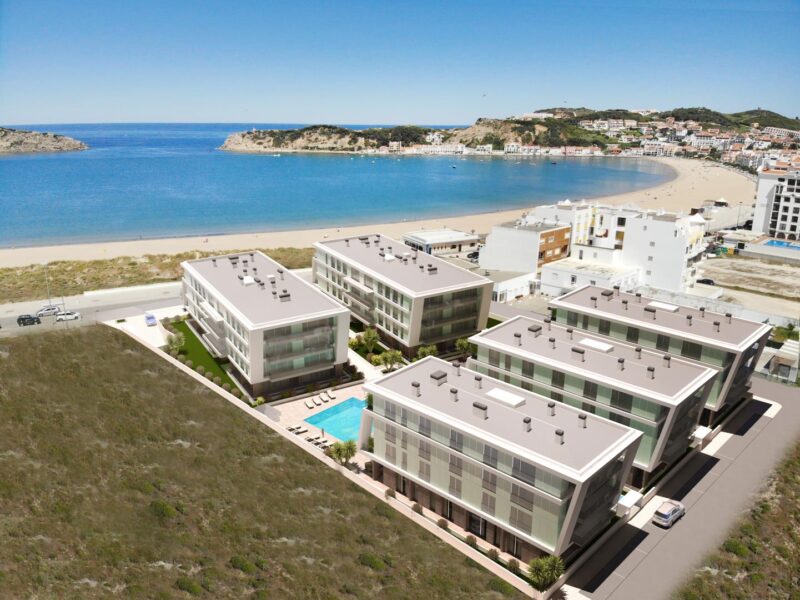
Condominium apartments facing the sea
São Martinho do PortoBeautiful apartments in São Martinho do Porto “Janela da Baía”! Located in the heart of…

Villa already finished and ready to move in: 4-suite bungalow on 750m2 plot in a quiet area of Azeitão
Rua de ParisHouse already finished and ready to move into! Close to shops and services, quick access…

Magnificent house with basement, indoor and outdoor pool in Verdizela/Aroeira
Verdizela/AroeiraNew turnkey project: magnificent single-storey villa, 498m2 in surface area, high-end finishes on a 1875m2…

Luxury apartment on the edge of a nature reserve
Your modern, spacious apartment between the beach and Lisbon’s capital. – Beach 5min – Golf…

House T3 1 10 min from Lisbon and 5 min from the beaches
PêraREADY TO MOVE IN! New T3 1 ready-to-live-in house in a quiet, rural neighborhood with…

4 bedroom villa with pool and jacuzzi in Aroeira
rua são miguelModern, minimalist architect-designed house with exceptional details in a quiet location in Aroeira 2-storey house…
Inscrivez-vous à notre newsletter
Recevez chaque mois les derniers articles de notre blog "la vie au Portugal" et notre sélection de biens immobiliers à vendre.

